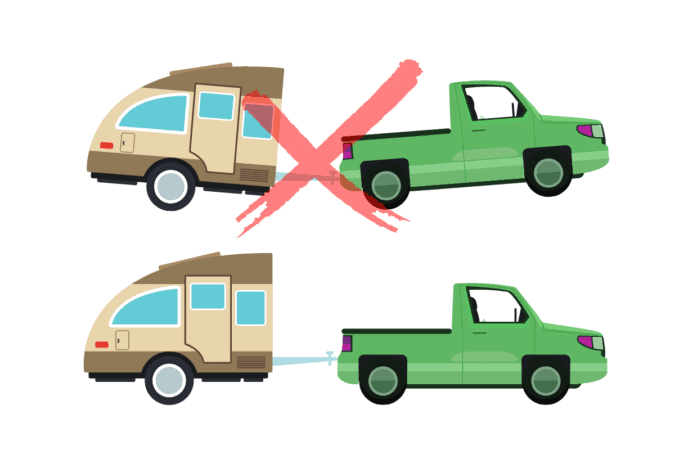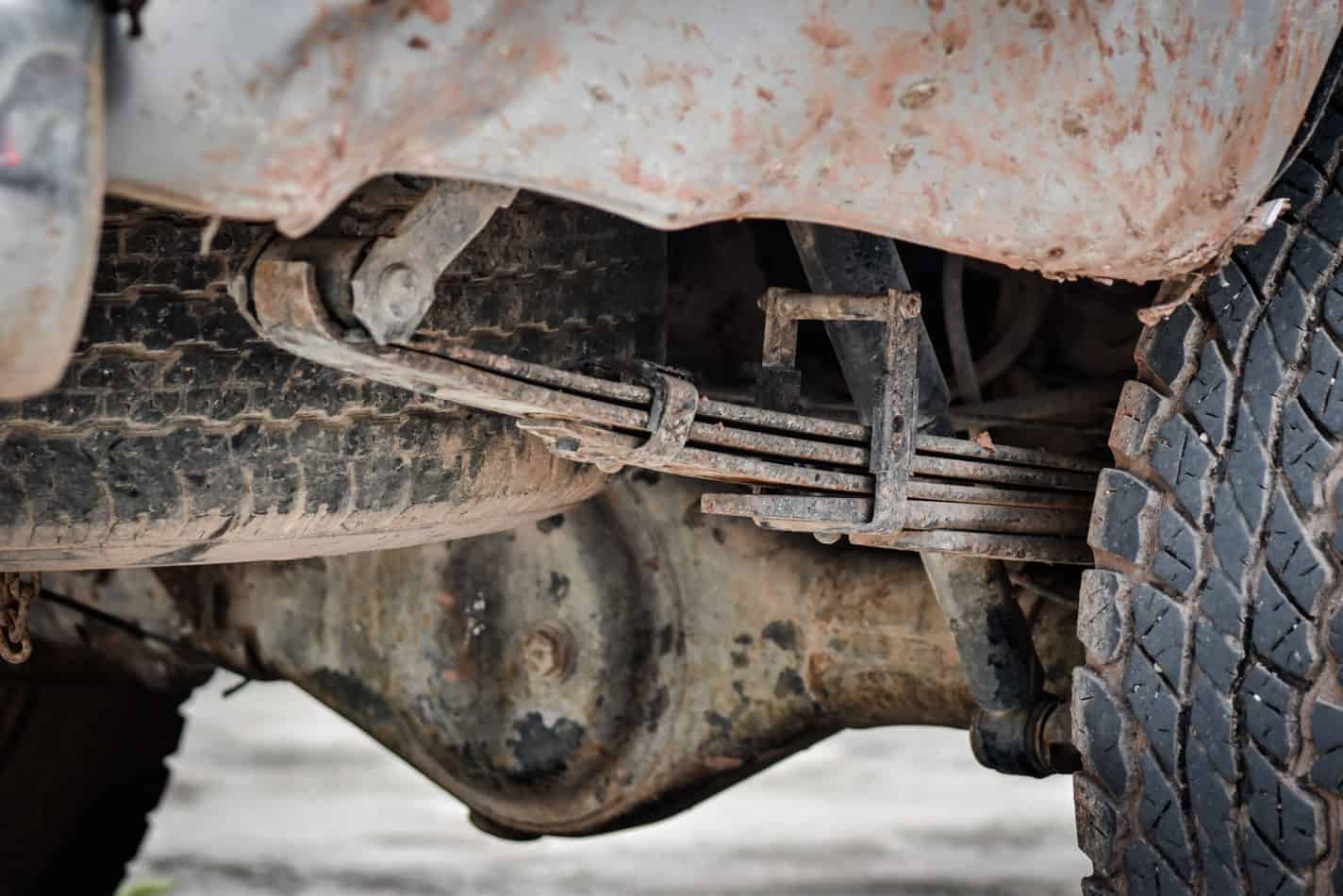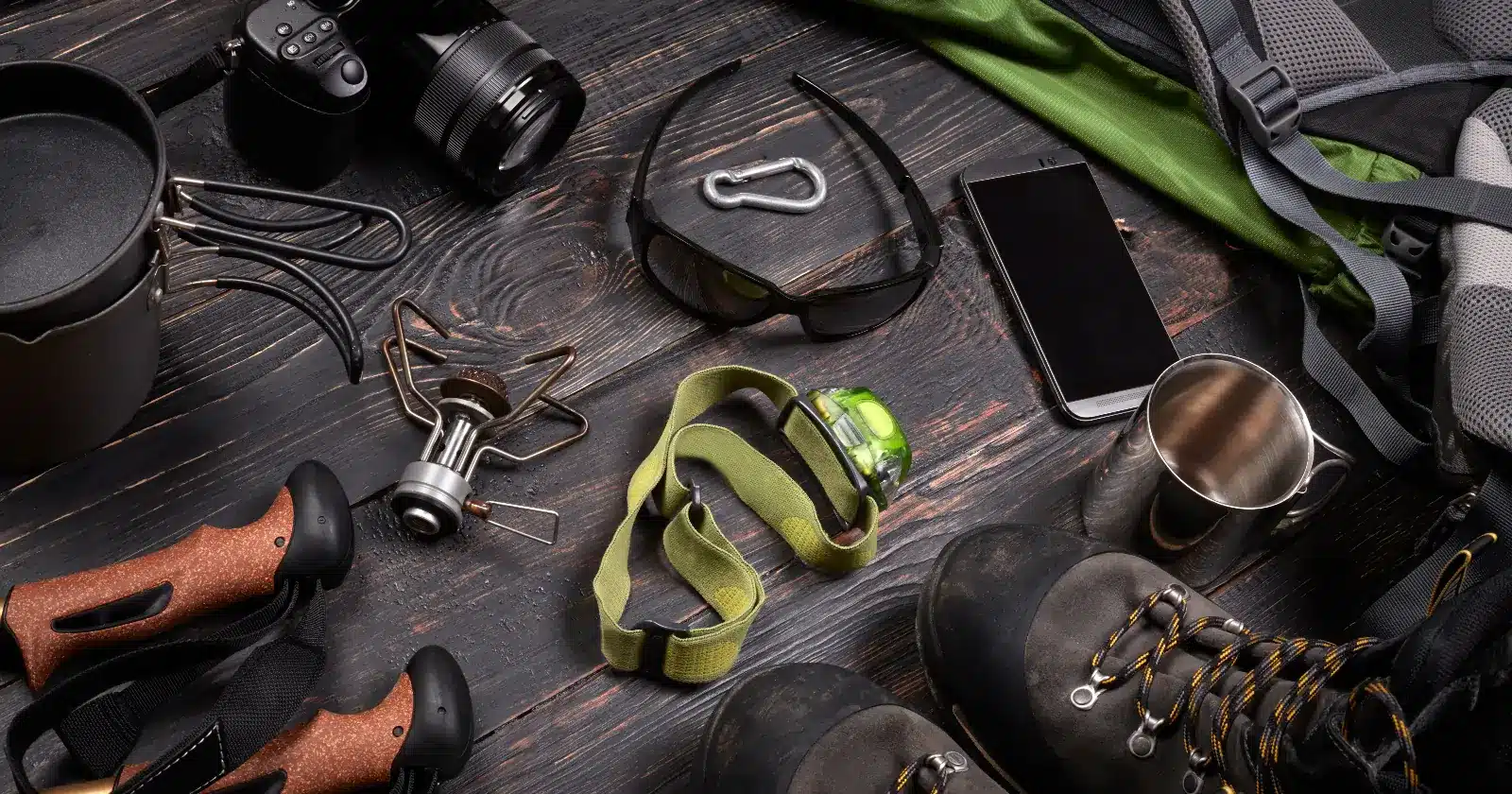Here’s how to avoid a potentially dangerous situation by knowing what to do when your truck squats while towing a trailer.
Getting your tow vehicle and trailer perfectly paired and rolling down the road straight and level takes some work. There are so many different weight ratings and capacities to consider; each vehicle and trailer has its own numbers. Having a level load is important for a variety of reasons, most importantly, safety. When towing a trailer, you want to try to avoid “truck squat” as much as possible.
What is Truck Squat?

Truck squat is when the rear of the truck is lowered and the front is raised. Not to be confused with the trend of the “California lean”, “Carolina squat” or the “Tennessee tilt” that some owners might intentionally install, truck squat when you’re towing is not intentional (or on-trend).
However, when the weight of a trailer is lowered onto your tow vehicle hitch it is normal and expected for the vehicle to squat a little bit. However, this squat should be minimal and the solution isn’t to just remove as much tongue weight as possible to avoid the squat.
What Affects Truck Squat?
If your truck squats when towing, it is important to make the proper adjustments before hitting the road. To do this you must have an understanding of what is causing the squat and the effects it has on both truck and trailer.
There are tons of towing forms, calculators, and many articles written about towing and weight capacities so we won’t go into them here. But just to refresh your memory here are some of the terms in the basic form that you will want to be familiar with:
- Gross trailer weight (GTW) – Weight of the trailer and its maximum allowed added weight (including gear, water, etc.).
- Tongue weight – Downward force on the rear (hitch) of the tow vehicle.
- Gross vehicle weight rating (GVWR) – Total weight of vehicle, occupants, and gear.
- Payload capacity – The total weight carried by the vehicle including occupants, gear, and weight on the rear hitch.
- Gross combined weight rating (GCWR) – Your GVWR plus your loaded trailer weight.
- Gross axle weight rating (GAWR) – Maximum weight that can be placed on the front and rear axle of a vehicle.
What Causes Your Truck to Squat When Towing?
There are a few reasons your truck may squat when towing a trailer. Again, a minimal amount of squat should not be alarming but having your trailer as level as possible is key.
Here are some reasons that your truck might be squatting.
Your trailer is too heavy
There isn’t a simple or safe fix for this one, unfortunately. If the weight of your trailer exceeds the payload capacity or maximum towing capacity of your tow vehicle, you will not be able to safely or legally tow it.
Maximum towing capacities are based on a few different things determined by the vehicle manufacturers. This number will be different for every vehicle and even different for the same vehicles with different options. That is to say, just because you havetowin a Ford F150 doesn’t mean your numbers will be the same as your friend with the same truck.
Most people look at that maximum towing number and compare that to the weight of their trailer and away they go. In most situations, it will actually be the payload capacity that you exceed first. It is important to note that you can be within all the maximum limits and still have a truck that squats while towing a trailer due to improper setup.
Payload capacity is the amount of weight the vehicle can be loaded with including people, everything you have inside and in the bed, and the tongue weight or weight placed on your hitch. When you start adding all of these things up, you max out pretty quickly.
If you are buying a trailer make sure you know what your tow vehicle is capable of safely and legally towing. If you find a trailer you just gotta have, it may mean upgrading your tow vehicle as well.
Uneven weight distribution
Provided you have an adequate and properly maintained tow vehicle then uneven weight distribution is the most common cause for squatting while towing a trailer.
Finding out your vehicle’s towing and payload limits and combining this with your trailer weight is just the beginning of setting up a safe towing configuration. Many people are within the limits on paper but still have uneven and, as a result, unsafe loads. Setting up your trailer so you have the proper amount of tongue weight and that all of the weight is evenly distributed is just as important.
The best weight distribution for your setup will be different from others. The most common numbers seen (and a solid starting point at least) is 10-15% tongue weight. As an example, if your trailer has a total weight loaded as it will be towed of 7500 pounds, then 750-1125 pounds of that weight should be on the tongue of the hitch.
Remember when calculating that the payload rating of your tow vehicle has to include this weight. Too much weight on the hitch and your tow vehicle is going to squat more. Excess squat is hard on your suspension and takes the weight off of the front of your tow vehicle. This affects steering and braking from the front wheels which can be unsafe.
Because of this, some people try to take the weight off of the hitch to eliminate this situation. The problem with that is that not enough tongue weight can also be a problem. The main effect is additional trailer sway.
So, what is the answer? You have to balance a few things and find the sweet spot for your setup:
- Stay under your max payload
- Have approximately 10-15% of your trailer’s loaded weight as tongue weight
- Have the extra stuff evenly distributed
If your truck squats while towing a trailer, look at these things to see where your problem is.
Incorrect or inadequte hitch
For many, the answer is a weight-distribution hitch. There is no question that weight distribution hitches are a game-changer when it comes to hauling heavier weights. In a nutshell, weight distribution hitches remove some weight from the rear of your tow vehicle and transfer some of it to the hitch and back to the frame.
A properly set up weight distribution hitch can eliminate squat in many vehicles. Vehicle manufacturers recommend them when towing over a certain weight. Your state may also require them if you’re towing over a certain weight.
The setup of the hitch is important because as mentioned before, you do want a certain amount of tongue weight when towing.
Air bags and helper springs
These items can help eliminate squat but it is important to understand they don’t allow you to tow more weight or exceed any manufacturer ratings.
If your vehicle has coil spring suspension, airbags inserted inside of the springs can help. They level your truck by adjusting the air pressure in the airbags. One downfall to airbags is although they help level your vehicle, they don’t distribute as much weight back to the front wheels of your tow vehicle. They should be used to help with squat but don’t solve the problem on their own.
Helper springs are similar in that they are not meant to increase the vehicle’s load-carrying capacity. They simply supplement the vehicle’s suspension and relieve some of the stress.
If your squat is minor and you are able to maintain a good tongue weight and weight distribution then airbags and helper springs can be used to fine-tune your setup.
Suspension problems
This one should be caught even before you hitch up. If your truck has some squat before it’s loaded up, it’s definitely going to have more when loaded. Making sure your tow vehicle is in excellent working order is very important.
Front suspension problems can also add to an uneven load. Don’t just assume the issue is with your rear suspension.
Some suspension issues, such as weak leaf springs, may not present themselves with no load. If you notice a drastic amount of squat when weight is added to your vehicle, have your suspension checked out. If you tow regularly, suspension parts will wear faster and so regular checks and maintenance will be necessary.

Towing a trailer is a large responsibility that must be taken seriously. Having the proper tow vehicle, properly setting up your hitch, and using correct weight distribution is key. If your truck squats while towing a trailer, correct it as soon as possible.
Continue reading:




